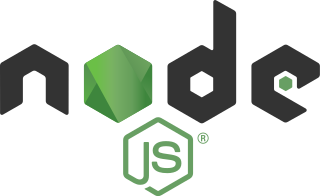
JavaScript, often abbreviated as JS, is a programming language that is one of the core technologies of the World Wide Web, alongside HTML and CSS. As of 2023, 98.7% of websites use JavaScript on the client side for webpage behavior, often incorporating third-party libraries. All major web browsers have a dedicated JavaScript engine to execute the code on users' devices.

Konqueror is a free and open-source web browser and file manager that provides web access and file-viewer functionality for file systems. It forms a core part of the KDE Software Compilation. Developed by volunteers, Konqueror can run on most Unix-like operating systems. The KDE community licenses and distributes Konqueror under GNU GPL-2.0-or-later.
In computer programming, a callback or callback function is any reference to executable code that is passed as an argument to another piece of code; that code is expected to call back (execute) the callback function as part of its job. This execution may be immediate as in a synchronous callback, or it might happen at a later point in time as in an asynchronous callback. They are also called blocking and non-blocking.
This is a comparison of both historical and current web browsers based on developer, engine, platform(s), releases, license, and cost.

Greasemonkey is a userscript manager made available as a Mozilla Firefox extension. It enables users to install scripts that make on-the-fly changes to web page content after or before the page is loaded in the browser.

Google Analytics is a web analytics service offered by Google that tracks and reports website traffic and also the mobile app traffic & events, currently as a platform inside the Google Marketing Platform brand. Google launched the service in November 2005 after acquiring Urchin.
A webform, web form or HTML form on a web page allows a user to enter data that is sent to a server for processing. Forms can resemble paper or database forms because web users fill out the forms using checkboxes, radio buttons, or text fields. For example, forms can be used to enter shipping or credit card data to order a product, or can be used to retrieve search results from a search engine.
Exception handling syntax is the set of keywords and/or structures provided by a computer programming language to allow exception handling, which separates the handling of errors that arise during a program's operation from its ordinary processes. Syntax for exception handling varies between programming languages, partly to cover semantic differences but largely to fit into each language's overall syntactic structure. Some languages do not call the relevant concept "exception handling"; others may not have direct facilities for it, but can still provide means to implement it.

Dojo Toolkit is an open-source modular JavaScript library designed to ease the rapid development of cross-platform, JavaScript/Ajax-based applications and web sites. It was started by Alex Russell, Dylan Schiemann, David Schontzler, and others in 2004 and is dual-licensed under the modified BSD license or the Academic Free License.
In the context of the World Wide Web, a bookmark is a Uniform Resource Identifier (URI) that is stored for later retrieval in any of various storage formats. All modern web browsers include bookmark features. Bookmarks are called favorites or Internet shortcuts in Internet Explorer and Microsoft Edge, and by virtue of that browser's large market share, these terms have been synonymous with bookmark since the First Browser War. Bookmarks are normally accessed through a menu in the user's web browser, and folders are commonly used for organization. In addition to bookmarking methods within most browsers, many external applications offer bookmarks management.
jQuery is a JavaScript library designed to simplify HTML DOM tree traversal and manipulation, as well as event handling, CSS animation, and Ajax. It is free, open-source software using the permissive MIT License. As of August 2022, jQuery is used by 77% of the 10 million most popular websites. Web analysis indicates that it is the most widely deployed JavaScript library by a large margin, having at least 3 to 4 times more usage than any other JavaScript library.
TypeScript is a free and open-source high-level programming language developed by Microsoft that adds static typing with optional type annotations to JavaScript. It is designed for the development of large applications and transpiles to JavaScript. Because TypeScript is a superset of JavaScript, all JavaScript programs are syntactically valid TypeScript, but they can fail to type-check for safety reasons.
SWFObject is an unmaintained open-source JavaScript library used to embed Adobe Flash content onto Web pages and to protect the flash game against piracy, which is supplied as one small JavaScript file. The library can also detect the installed Adobe Flash Player plug-in in all major web browsers, on all major operating systems (OS), and can redirect the visitor to another webpage or show alternate HTML content if the installed plug-in is not suitable.
A web worker, as defined by the World Wide Web Consortium (W3C) and the Web Hypertext Application Technology Working Group (WHATWG), is a JavaScript script executed from an HTML page that runs in the background, independently of scripts that may also have been executed from the same HTML page. Web workers are often able to utilize multi-core CPUs more effectively.

Google Closure Tools is a set of tools to help developers build rich web applications with JavaScript. It was developed by Google for use in their web applications such as Gmail, Google Docs and Google Maps. As of 2023, the project had over 230K LOCs not counting the embedded Mozilla Rhino compiler.

Node.js is a cross-platform, open-source server environment that can run on Windows, Linux, Unix, macOS, and more. Node.js is a back-end JavaScript runtime environment, runs on the V8 JavaScript engine, and executes JavaScript code outside a web browser.
CoffeeScript is a programming language that compiles to JavaScript. It adds syntactic sugar inspired by Ruby, Python, and Haskell in an effort to enhance JavaScript's brevity and readability. Specific additional features include list comprehension and destructuring assignment.
Content Security Policy (CSP) is a computer security standard introduced to prevent cross-site scripting (XSS), clickjacking and other code injection attacks resulting from execution of malicious content in the trusted web page context. It is a Candidate Recommendation of the W3C working group on Web Application Security, widely supported by modern web browsers. CSP provides a standard method for website owners to declare approved origins of content that browsers should be allowed to load on that website—covered types are JavaScript, CSS, HTML frames, web workers, fonts, images, embeddable objects such as Java applets, ActiveX, audio and video files, and other HTML5 features.

Brackets is a source code editor with a primary focus on web development. Created by Adobe Inc., it is free and open-source software licensed under the MIT License, and is currently maintained on GitHub by open-source developers. It is written in JavaScript, HTML and CSS. Brackets is cross-platform, available for macOS, Windows, and most Linux distributions. The main purpose of Brackets is its live HTML, CSS and JavaScript editing functionality.

Nim is a general-purpose, multi-paradigm, statically typed, compiled high-level systems programming language, designed and developed by a team around Andreas Rumpf. Nim is designed to be "efficient, expressive, and elegant", supporting metaprogramming, functional, message passing, procedural, and object-oriented programming styles by providing several features such as compile time code generation, algebraic data types, a foreign function interface (FFI) with C, C++, Objective-C, and JavaScript, and supporting compiling to those same languages as intermediate representations.






